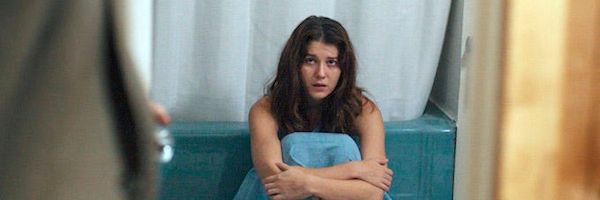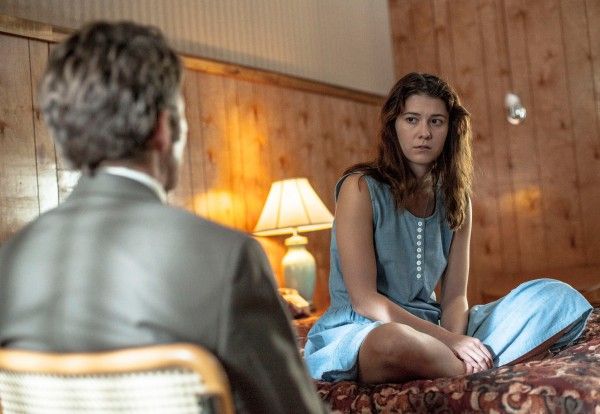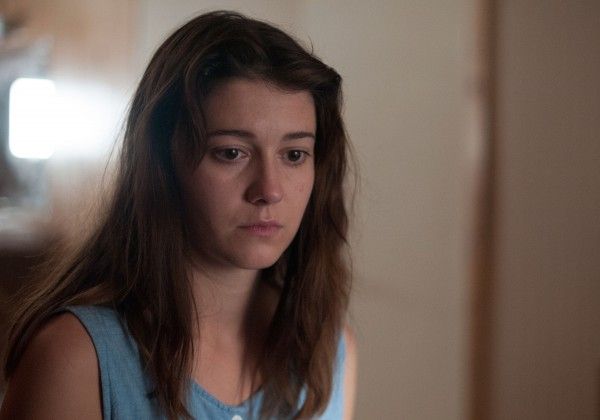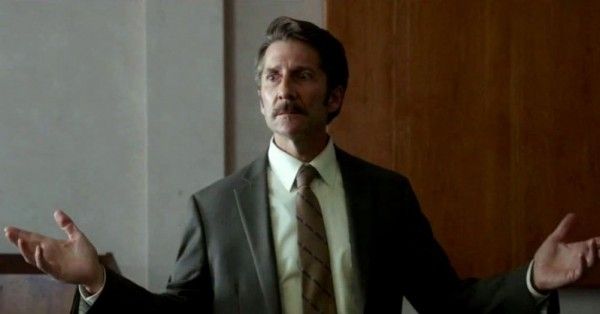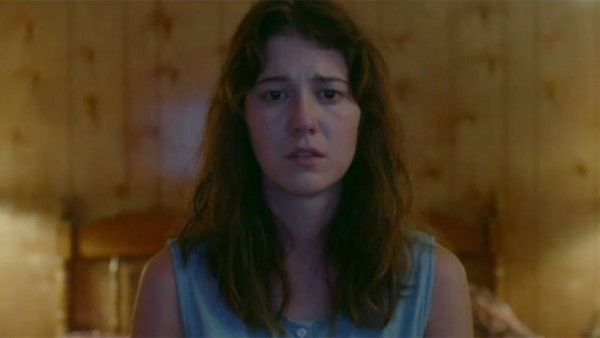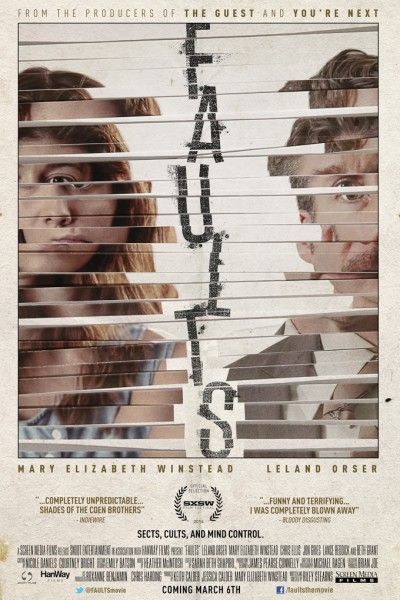In the indie dramatic thriller Faults, Claire (Mary Elizabeth Winstead) is a part of a mysterious cult called Faults. Desperate to get their daughter back, her parents recruit Ansel Roth (Leland Orser) to use the risky method of deprogramming to get Claire aware from the cult, but Ansel quickly finds himself in a battle of wits that draws him in, deeper and deeper than he ever expected.
At the film’s press day, actress/producer Mary Elizabeth Winstead spoke to Collider for this exclusive interview about why she wanted to work with her husband, writer/director Riley Stearns, on Faults, initially not being sure if she could pull off this character, testing out their working relationship by making some shorts before doing a full-length feature, finding her performance, how little the script actually changed, and what it is that attracts her to a project. She also talked about working with John Krasinski, as a director, on The Hollars, why she’d like to try her own hand at directing, and the experience of being a part of the top-secret Bad Robot film Valencia, with John Goodman and John Gallagher, Jr.
Collider: As your husband was working on this movie, was it always a given that you were going to be in it and play this character?
MARY ELIZABETH WINSTEAD: Yeah, I think it was always a given in his mind, and I, of course, always wanted to be in it. I was reading it 10 pages at a time, as he was writing it, and as my character started to come into it, I was like, “I don’t know if I’m the right person for this part. Are you sure you want me?” I think I had read at least what I thought were similar roles in other scripts, and I was always told I wasn’t right for them. So, in my head, I was like, “No, I’m not this girl! I’m not right for this part! There are other people who are better, weirder, quirkier, darker and have an edge to them.” I don’t have any of those things, so I really wasn’t sure I should play it. But, I went forth and decided to figure out how to make it work. Once we were actually shooting it and it came to life, and all of the other actors were there, then I started to feel really comfortable and have fun with it. But I was very scared, for awhile there. Ultimately, it was an asset to not be the obvious choice. It just always takes me a little while to wrap my brain around that.
Because of that, did you try to influence your husband, in regard to the character?
WINSTEAD: Oh, yeah, definitely. Part of it was that he always knew I was gonna play it, so I was worried that the character would be underwritten and that he wouldn’t really put as much detail into it ‘cause he’d be like, “You’re the actor. You’ll fill in that.” So, I was preemptively like, “Make sure you make this character really interesting.” My character doesn’t come into the script for quite a long time, and the first 30 pages are so strong. I was like, “Please don’t, when you introduce the girl character, make her the least interesting thing in the whole script.” That’s happened to me, a few times, in reading scripts. So, he definitely knew, going into it, that the pressure was on for him to write an interesting female lead. And as it was going, there were a couple of times that I [pointed things out]. The first chunk of the movie, there was a lot of talking about the cult and explaining things and explaining who she is. I was like, “I don’t want that to be all that she does. Let’s make sure that there’s other layers of things going on.” So, he added a couple scenes, early on, that showed a bit more of her strange personality. That was helpful for me, in terms of getting excited about it.
It almost seems like a different movie when she comes into the story, especially in terms of the tone.
WINSTEAD: It does. The tone shifts and the story shifts. As it goes on, it gets progressively darker and darker, and less and less funny, and weirder. It was great to be at the center of all of that weirdness. I loved it.
Were you ever hesitant about working with your husband, or was it something you’d always wanted to do?
WINSTEAD: I think it’s something we’ve always wanted to do. We have made some shorts together, which helped test the waters, in terms of how we work together. Years ago, we tried writing together, which didn’t go as well because he has such a clear idea of the things that he wants to do, and I was like, “This isn’t fun for me. We’ll put that aside.” Instead of trying to force it, I was like, “I don’t think that’s the best way that we collaborate, at least not right now.” I think the producer-director relationship and the actor-director relationship work really well for us because I love his voice so much. As an actor, when I love a filmmaker, all I want to do is help bring their vision to light, and the best producers also think of their jobs as doing that. So for me, it was the perfect thing to just have this partner who I love and want to help, not only because he’s my husband, but also because I love him as a filmmaker and want to see him do more stuff and want to help his vision be put out there. It was the perfect thing for us to do, and I hope we get to do more of it. It was really fun. My role, as a producer, is being his partner and allowing us to be a united front, so that there’s a little bit more strength behind being able to do what we want to do. The two of us together work really well.
Did that make any of the other actors on set a little bit nervous, that you guys had such a close relationship and bond?
WINSTEAD: The actors knew because they knew us, personally. But, almost nobody actually knew that we were a couple. We didn’t intentionally not act like a couple, but we fell into more professional roles on set. We had an on-set wrap party on the last day, and we were hanging out and hugging and kissing, and the crew was like, “What?!” They had no idea. We definitely didn’t bring that kind of relationship to the set. He didn’t really even give me a lot of notes, ever. There were times where I was like, “Do people think that it’s weird that you never direct me?” He was like, “We just know each other so well that I don’t ever have to say anything to you.” I was like, “Maybe you should start directing me more, so it doesn’t seem weird.” We never had a conversation about anything because we had all the conversations we could possibly ever have about it, so by the time we were on set, nothing needed to be said.
Because this girl has so many layers to her personality, and the more the movie goes on, the less you know what her motivations truly are, did you have discussions about that, ahead of time?
WINSTEAD: Yeah, we had some discussions about it. I went down a few different rabbit holes of trying to find my way into her. I researched cult members and cult leaders. I really became very fascinated by who this character could be, and what her motivations might be. And I liked thinking that she came from a super normal family and there’s not some dark history to her, whatsoever. She just was born weird. That, to me, was more fun and more interesting than coming up with some backstory where she’d been abused. I think it’s more interesting if she had a perfectly normal upbringing, and then became this person. She’s just messed up. I find that whole nature vs. nurture conversation very interesting.
Since you read this script throughout the process of it being written, did it always follow this journey and was the end point always the same?
WINSTEAD: Yeah, he wrote the script in two weeks, and it really didn’t go through a lot of changes, after that. It was one of those things that had been an idea that was sitting with him for so long that, by the time he wrote it, he knew what he wanted it to be. I know there were minor changes, and there were minor notes that I had, all the way through, but nothing that was a huge plot change. There were dialogue adjustments and maybe little character adjustments, here and there, but for the most part, it was always the movie it is now. It was always that, from the get-go. I’m amazed at how he came up with it, and the fact that he didn’t have to go back through and go, “This doesn’t lead into this quite right.” He didn’t really have to do that, and I don’t know how.
What is it that attracts you to a project? Do you just go with your first instinct about a project?
WINSTEAD: I guess I’ve just gotten to the point where I don’t want to be bored by the characters that I play, and I don’t want to feel like I’m having to make something more interesting or I’m having to force something that’s not really there on the page. I want to be inspired by the characters that I play and excited by the projects that I do. That’s really everything that drives me now. It’s just about trying to find material where I’m doing more than just being a plot device. I want to actually get to do scenes that go to interesting places and are challenging to me. I’d like to try to keep upping the ante on that. I know that it can’t be that way, every time out of the gate, so I have to remind myself of that. You do sometimes have to work on things where you love the cast and you love the filmmaker, and the role might not be great but it’s fun. I’m totally down to do those things, and will continue to do those things, as well, but it at least has to be peppered with roles that are really interesting and that are hard. Otherwise, I’ll just get really bored and there won’t be much point. Especially in the past few years, I’ve really taken things into my own hands and tried to make sure I find that material because it doesn’t really come to you very easily, if you just sit and wait for it. It seems like every couple of years, I have to remind myself of that. When I’m like, “Why am I not doing what I want to be doing?,” it’s like, “Well, because you have to get off of your ass and go find it.” You have to go meet those filmmakers you want to work with and read those scripts and find out how you can get a foot in the door. I’ve continued to learn that, no matter where you are in your career, you will never stop having to do those things because the things that come easily are always going to be the things that are less exciting. I have to keep working to find the stuff that excites me.
What was it like to be directed by John Krasinski for The Hollars?
WINSTEAD: It’s a small part. I was actually shooting The Returned, so I just went and showed up on his set for a couple of days, on a break from [the show]. It was a very small part, but super fun. He’s a sweetheart, and I was really happy just to get to work with him. He was just so full of excitement and passion. He was really lovely, and he wrote a really nice letter to me, asking if I would do it. I had met him before, but only briefly, so I didn’t actually know him. But, I was super happy to be amongst that really great cast. It was a great script on that, so it was fun.
After working with your husband, in that capacity, and then John Krasinski, did it inspire you to also want to direct?
WINSTEAD: It did. I think every film I do, I’m paying more and more attention to all of those things, and watching the directors and how they work. It’s making me feel more like I could eventually do it. I do want to direct, eventually. I don’t know if it will be a short film or a music video or a feature, but I know that I want to at least try it and see. I’ve learned, watching [my husband], that you’re never really ready. It’s like what they say about having kids. You’re never ready, you just have to do it. Particularly for women, I think more of us in the industry need to just do it. I think guys are more willing to put themselves out, that way, at least with the girls that I know. We say we want to direct, but then we don’t actually do it. So, I need to, one of these days, just do it and put myself out there and figure it out. It’s all on-the-job learning with that stuff. I think I’m getting more and more ready to try it.
How was your experience making Valencia with Dan Trachtenberg?
WINSTEAD: That was really cool and really fun. It’s one of those Bad Robot, can’t say anything about the script type of projects, but it was really fun. It’s another really contained film. It’s just three actors, in the whole thing. It’s me and John Goodman and John Gallagher, Jr. I get to be a little bad-ass in it, which was really fun. It had been a few years since I’d done something like that, so that was really cool. I won’t give away too much, but I’m excited about it, for sure.
Have you gotten to see it yet?
WINSTEAD: Just bits and pieces. I was at Bad Robot the other day, and they showed me the trailer for it, which looks really cool. I’m excited. It’s going to be really interesting. It’s basically my character wakes up in a cellar and I’m being kept down there by John Goodman. He tells me that basically the world is over outside because there’s been a nuclear fall-out. It does have similarity to Faults, in some ways, because you don’t know who’s telling the truth or who to believe. There’s a lot of, who’s manipulating who, and all of that. Tonally, it’s very different, but it has some of those same themes.
Faults is now in theaters and on VOD.

